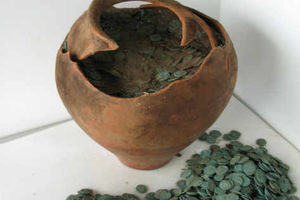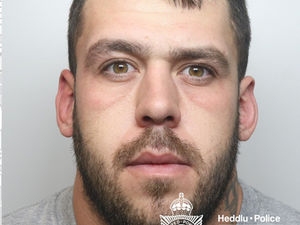How rain revealed Shropshire's Roman coin haul
A sudden downpour led a rookie treasure hunter to one of the biggest hoards of Roman coins ever found in Shropshire, he revealed today.

A sudden downpour led a rookie treasure hunter to one of the biggest hoards of Roman coins ever found in Shropshire, he revealed today.
Nic Davies from Ford, near Shrewsbury, has become the envy of time-served metal detecting enthusiasts after digging up the haul of bronze coins in 2009.
The hoard, which has been described as an 'exceptional find' was yesterday declared as treasure by coroner John Ellery at a hearing in Wem.
Speaking after the hearing Mr Davies said: "I'd never hunted for treasure before with a metal detector but a family friend has done it for 34 years, so I guess this hoard gives them renewed hope.
"I'd been at the site for three or four hours and found nothing.
"It started to rain so I stepped into a gap in the bushes and then the metal detector beeped so curiosity got the better of me.
"I found one coin just beneath the soil and then dug down and found more and more coins. I was quite shocked."
Yesterday's treasure trove inquest heard from Peter Reavill, finds liaison officer for the Portable Antiquities Scheme, which records archaeological finds made by the public.
He said the coins at the top of the pot appear to date from the period 333-335AD, late in the reign of British Roman Emperor Constantine I.
Coins at the bottom appeared to be about 10 years older, suggesting the pot was either part of a community ceremony to honour the gods or perhaps about six months' pay for a Roman legionnaire.
He said British Museum experts who examined the find said the coins came from across the Roman empire in places like Greece, Turkey, Germany and France.
Designs on the backs of some of the coins, which are known as nummi, allude to the legend of the twin founders of Rome, Romulus and Remus, who can be clearly be seen suckling their she-wolf mother on one.
Another design celebrates the city of Constantinople as the 'new Rome'.
Experts have said the hoard lifted the lid on the way people in Shropshire lived at that time, revealing that people outside the south of Britain were used to using coins as a currency system.
Dr Eleanor Ghey from the British Museum said: "This is an exceptional find of late Roman coins from Shropshire.
"It challenges the view that the wealth circulating in the south of Britain at this time had little impact on the areas further north and west.
"Some of the coins in the hoard were produced in the eastern Mediterranean and travelled a long distance in the short time before they were buried.
"The fact that the coins were still in their pot when it was excavated has given us a fascinating snapshot of Roman life. Whoever buried these coins kept their location secret for a number of years before adding more to the hoard."
Emma-Kate Lanyon, curator for Shropshire Museums said: "This is a very exciting find and probably the largest coin hoard, at least in modern times, to be recovered from the county.
"The Treasure Act and Portable Antiquities Scheme is now over 14 years old and has vastly increased our understanding of Shropshire's past by bringing finds like this to the attention of archaeologists."
Giving evidence, Mr Reavill added the lower parts of the coin pot also contained several fragments of preserved cloth and an iron nail. He said it was hugely significant, as organic remains normally rot in the ground. The presence of the materials could, he said, suggest a nailed up bag, deposited within the hoard.
This practice, although rare, is possible evidence of a ritual offering.
In the Roman world gifts were given to the gods in anticipation of future results, such as recovery of stolen property, improved health or a good harvest.
The inquest heard the site of the find cannot be disclosed for security reasons. The inquest heard the coins were found just off a bridleway in a wooded area near Shrewsbury. Mr Ellery said: "I have heard all the evidence I am going to hear into discovery of the Roman coin hoard in the Shrewsbury area. I have the exact location but I'm not going to disclose the precise details to preserve the integrity of the site.
"It's clear the finder did not have permission to enter the land with his detector. People should always seek permission. The advantage for the finder is that he is likely to receive a substantial reward for the find.
"I conclude and declare that the hoard of 9,315 coins found by Mr Davies are treasure."
By Tom Johannsen





